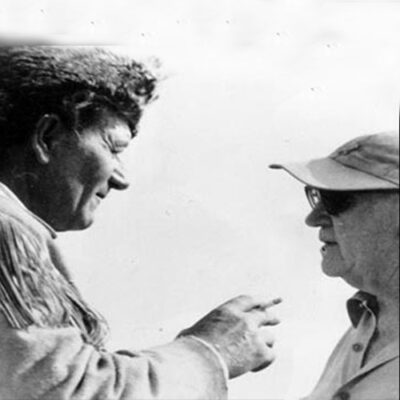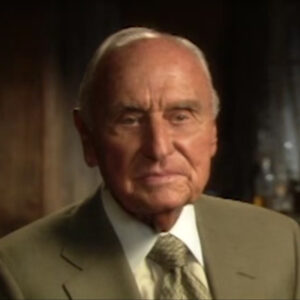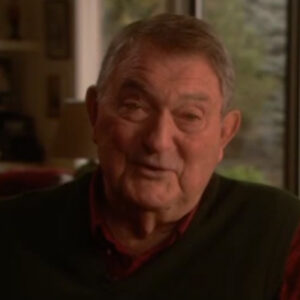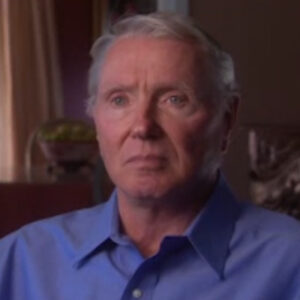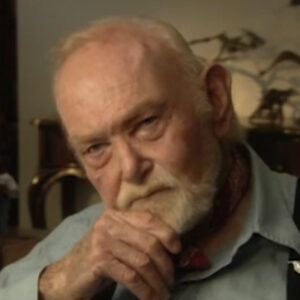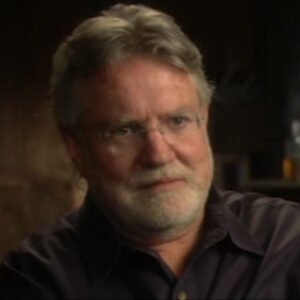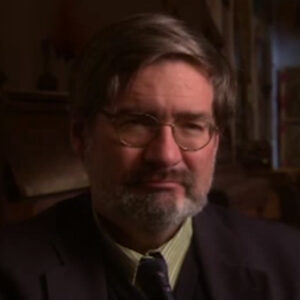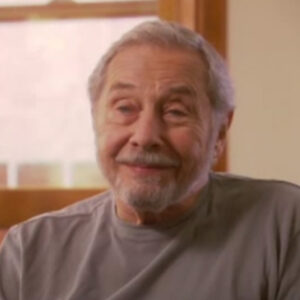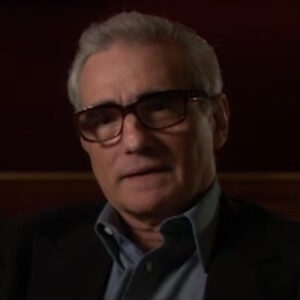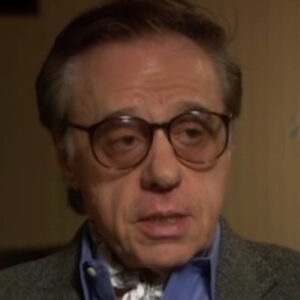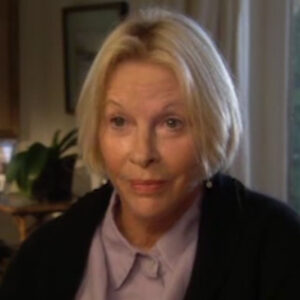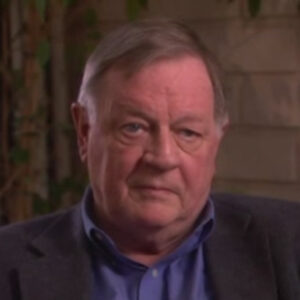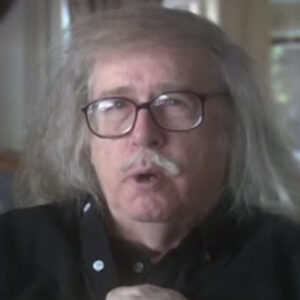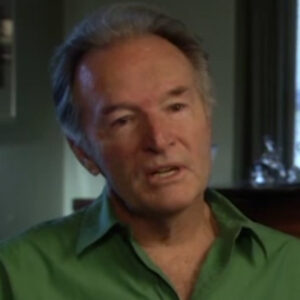Speaker Forged reputations to many people, and so they call him the American poet of silver. What do you what do you think of that job for?
Speaker Well, I’m suspicious of poetry in cinema. First of all, I’m not sure that there’s a place. For poetry, and I think that on the whole, directors who aspire to be poetical are going down the wrong track.
Speaker I would never put Ford in the top category for myself.
Speaker But I mean, I think he he definitely deserves a place high in the second division.
Speaker You know, I mean, I think he’s a he’s an interesting director. And I’m sure we’ll get into a lot of the reasons for the interest. But but no, for me, he is not in the first rank and.
Speaker I will make a prediction, I think that he is already dating badly, and I think that in another 20 years there’s going to be much more questioning of him and much more suspicion about him altogether.
Speaker When you say very badly, I mean, people people look at my Darling Clementine in state’s culture for the party. Those of us who are so still because of majestic pieces of work, I think they’re relics.
Speaker I think that my darling. My Darling Clementine. It has nothing.
Speaker To do with its ostensible story, it has it’s trying to tell one of the great stories in Western history, I mean, the history of the West in America, the story of the ERPs, which I think is remarkable and I think needs to be told this is. Ford’s legend about the ups and it is backed up with a very, very picturesque pictorial view of that part of the world, but for me and another part of the world, quite well, it doesn’t really have the authentic feeling.
Speaker Of those places, and I think it’s I think it’s a storybook legend all the time, and I think it’s telling lies and my my fundamental problem with Ford.
Speaker Is that at this point in our history after.
Speaker Six decades or whatever it is of George W. Bush, when is it that we wake up and decide that we need to present the facts, not the legend printing the legend, ignoring the facts has led America to the brink of disaster. And it’s one of the things Ford’s films counsel and advise. And I think it’s cockamamie and dangerous and infantile and stupid, none of which for me are the qualities of poetry.
Speaker So when you say four, there’s a myth, maybe it was a wishful thinker, a moviemaker, but then they have a vision for how to count that as well.
Speaker Well, he had to lie. There’s no question for her. And I and I you know, I’m not putting him in the Fifth Division. He had an I. I think it’s a conventional army. I think it’s an army that is deeply affected by certain kind of paintings of the 19th century in the early 20th century.
Speaker It’s a it’s a sort of it’s a pipe dream view of the West as a wonderful place for guys to go and have adventures. I think the West was amazingly rugged, hard, unforgiving place. I mean, I much prefer the look of the West that there is enormous demands, films where I think you really feel the awesome nature of topography, of height, distance, and how tough it is for the human figure to exist and survive in that from what Ford’s West Ford’s images, many of which are pretty.
Speaker No question about it. I think it’s like I think it’s like a back projection for old guys sitting on the porch telling stories about how it wasn’t.
Speaker And, you know, for me, Ford’s Westerns particularly glorify.
Speaker A number of ideas, if you want to raise them by calling them ideas that are shocking and are ridiculously untrue, like the Indians were hostile and they had to be frauds and they had to be defeated. Absolute nonsense and racism and a go to the Indian reservations today.
Speaker I hope this film unit will go to those reservations to see how impoverished has set back remarkable tribal cultures were. Now we know this more or less. We know what we did to the Native Americans.
Speaker And Ford’s films are until the very end, until the dreadful shadows in which I think even for love isn’t always about them. There was a change of heart with Sharon. I think he became guilty. I think he I think he realized some of the lies he had been telling. I don’t think he was a fool. Not only Henry Ford was a stupid man, and I think that he lived long enough to get to a point where America was changing. I think he was deeply disturbed by many of the changes that he was deeply disturbed by the civil rights movement. And a lot of that feeds into the searches and feeds them quite positively into the searches. But I think the civil rights movement was only about 100 years too late.
Speaker Let’s go back to one of his films for the party. Yes, the sequel for The Factory, where Henry Ford is going Thursday, has a powwow meeting with coaches. Yes. Now, the way forward to fix coaches in that sequence is a testament to the natives.
Speaker The Native Americans are half people know absolutely coaches. And that film is he’s an interesting character. But then I think you have to ask why Ford is known and glorified by many people for that line of cavalry that kept the West safe.
Speaker I don’t think that line of cavalry kept the West safe.
Speaker I think that line of cavalry imposed a certain kind of racist lie on the West. I think they were there. There were many Indians like coaches. And I think that we could have had a history that dealt with the Native Americans far more reasonably if we had not been so greedy and so racist towards them. And I think to that extent, Ford is doubly convicted in that he met Indians. He met enough of them to know that they were, many of them perfectly reasonable people, certainly as reasonable as the people were white people.
Speaker But he also was trying to I mean, sometimes I think we have to think, OK, for this within the context of his times, in the context of this. I agree.
Speaker You know, and that, you know, he was the down there, but he also was a product of the times of the world. Yes. I mean.
Speaker There are four biographies I’ve been reading in the history I know about for the man themselves in Monument Valley families. They say he thought it was great that Ford came, was able to bring the work and bring the food.
Speaker I mean, if he thought he was helping in some way to the people, how would you react to that?
Speaker I think that’s a fascinating issue.
Speaker And and I think the case can be made that he brought some money to the Navajo and may have helped them in some ways. I think, however, by.
Speaker Misrepresenting their place, above all, Monument Valley, he did great damage to their culture and to their religion and to their feelings, and I think that in total, however decent he may have been on the spot to some of them, I think he’s one of those directors, one of those storytellers. And God, there’s a legion of them. I’m not saying that’s not who perpetuated the notion that fighting the Indians was a necessary. Defense of America. And I am so sick and tired and I am an American citizen, whatever, despite my ability to speak English, I am so sick and tired of America’s determination and its great power of these small nations here, there and everywhere that have to be attacked to protect American. I think it’s humbug. I think it’s deadly, dangerous, and I just wonder when we wake up to it and when you and I as film buffs. With much in common, I’m sure many tastes in common when you see that Ford is instrumental in this movement, so we ended up for the fact he probably makes you very angry. Only the Fort Apache is is part of that mythmaking that was still there in The Man Who Shot Liberty Valance, which really says and told me, if you think I’m wrong, it says that men and society need legends and myths to live by. And it doesn’t matter if those legends and myths sometimes deny or contradict the facts. Don’t print the facts. Well, every empire in the history of the world that has believed in not printing the facts has ended in ruin. Get ready.
Speaker And you said you said your sister says that wells and coal and father two poets of nostalgia.
Speaker Are you question what that really means, it turns out, in respect of Ford and Wells?
Speaker Well, I do. I, I mean, again, that’s a fascinating issue.
Speaker I’m not sure that America yet deserves to be nostalgic. This is a very young country. This is a country that, by contrast with the countries of Europe and Asia, is a country that’s constantly moving forward and is in fact obliterating its promised. And the nostalgia, I think, is often. The response to that feeling of having no past, it’s a fabricated past, it’s a concoction and it’s often not true. And I’m against it, I’m against any of these ideas and these attitudes and interpretations, if they really do not stand up to historical test, I think that. In both Ford and whorls, and I would agree with Andy Saracen’s, there is. A feeling for your own past, how you remember and that, I think is a great subject of art and and I I like that subject. And I think that if you treat it, you know, to treat it honestly, it’s enormously valuable.
Speaker I think the attitude to that small Indiana town, say, in The Magnificent Ambersons and the whole notion of a Midwest that was once before traffic came, I think that is beautiful and means a great deal. Yeah.
Speaker And you also stated yesterday that Welles’s notion of the is a little more complicated.
Speaker Yes. And for I think Wells was a much more complicated man than flawed. I think Wells. Wells was so good at so many things that people overlook the fact that he was a brilliant thinker. If you look at Wells, his interviews for Wells, an idea and he jumps on it and he develops it and he argues with himself.
Speaker I mean, he was I think he was an intellectual. I don’t think you have to be an intellectual to be an artist. But I don’t think Ford was an intellectual. I think that Ford like to assert things. I think Ford was a bully. I think that he would tell everybody something and expect them to go with it. Sometimes it was a test. Sometimes he was bullying you just to see if he could needle you and get under your skin and get you to say something interesting back, but. I think Ford had the drunk’s interpretation of history and in other words, the drunker you get, the more extremely you believe everything, but the emptier the belief becomes.
Speaker People have sort of said that one of the world’s fourth major weaknesses is that the slapstick of the body is in some of his films when Victor McClarkin is Quinkan and in Fort Apache, Argentina. Yeah, yeah. And we are grinding it out. I mean.
Speaker I mean, any strength that you see in Ford’s films?
Speaker Oh, Glenn, many yeah.
Speaker You know, I don’t like the Irish vaudeville element, which is what I think it often often is and comes from. And the community of drunken sergeants in some of his films is not one that I wish to belong to.
Speaker But yes, I see many virtues in his films. And there are four films I understand this may seem like I like very much. I like The Searchers very, very much.
Speaker I like she wore a yellow ribbon. I don’t look to Ford for profound humor.
Speaker I mean, he doesn’t make me laugh in the way he walks, makes me laugh. But this may be a temperamental difference, folks, who works harder and a much more verbal sense of humor. He like and he like playing with words. I don’t think Ford was interested in that. And he doesn’t have to be. But if we’re going to talk about particular things and weaknesses, we should talk about Ford’s use of women.
Speaker Oh.
Speaker Yeah, I mean, I think that he clearly he had a great eye for beautiful women and he had a fondness for beauty, but. What a trade is that for me, is that the women?
Speaker Have finally to be obedient to a male vision of the world. I hate that, I love that, I think that is. As bad as racism, I think it’s in fact, I think it’s another form of racism. I think it’s the white man’s interpretation of the law of the world and in in movie terms, where certainly in American cinema, we have a regular tradition of men and women being together and talking together. I think it’s a great weakness in courtrooms. Now, many of these women are splendid, beautifully posed, looking out at the far prairies for their man to come back or not to come back. They are beautiful women. They are decent. They are they are kind. They are deeply respectful of family and so on. They just don’t interest me as people compared with, say, the women and hawks who will argue back, who are not obedient.
Speaker I like women who are not obedient.
Speaker So women who when you tell them to be quiet when you’re filming, just carry on regardless, you know, because it’s their job.
Speaker So we go out on their subjects for the Rio Grande River as a strong female character means, amigo, she’s a pretty strong female character. Yeah.
Speaker Yeah. I don’t mean to say that Ford could not and did not believe in strong women. I think he did. And indeed, if you go back to how Green was my valley, the feeling for women, men in the family was very strong. But I do not believe that Ford’s own background and his upbringing and his education have prepared him for what I would call real independence and a woman in which the woman decides the ways in which she’s going to be strong. I mean, you know, black people and at a certain time were regarded very favorably by white people because they were strong in the ways white people wanted them to be strong and which they do a big job of work in the fields in the day.
Speaker But we now know that black people can decide their ways of wanting to be strong and thank God.
Speaker And and I think the same applies to women, too. But yes, it’s not that he does not have respect for women. He adores mothers. I mean, to be a mother for Ford is an enormously important thing. And that’s clearly Irish. It’s clearly Roman Catholic.
Speaker And I’m not trying to deny that. But, you know, there are women who’ve decided, well, you don’t have to be a mother to be a woman and have to be a Catholic to be a woman. And I go with that.
Speaker When you were saying, though, that if the search is really, you know, when you can fix her up, I think the search works beautifully.
Speaker But the search is for me, is also full of questions.
Speaker Here’s one.
Speaker Debbie.
Speaker Has been taken, she has been kidnapped by the Comanche. She lives with Skar, and I know every time the name comes up on the soundtrack, it’s ominous.
Speaker And I know Skaar is played by a Germanic actor, but Skaar is still a very handsome man.
Speaker And Natalie Wood and don’t forget this, Natalie Wood, five years later, whatever it is, looks pretty good. It’s not as if she’s been brutalized and beaten and scarred. She looks as if maybe she’s getting laid regularly and is feeling pretty good for it. And I have always longed for a version of The Searchers where she looks up at Geoffrey Hunter and indirectly at Wayne and says, I’m not going back.
Speaker You will live in that cabin.
Speaker In the middle of nowhere, I’m not going back to that was the dullest place I’ve ever had. You don’t know how exciting tribal life can be. I play with it, obviously.
Speaker But but but again, the character is absolutely obedient to what the man looking for. Expect that she will immediately come back. And we are to assume that she will revert overnight almost to being a nice white American girl, anyone who had been through that experience.
Speaker Would be filled with complicated feelings, and if she looked as if she’d been going through hell with scars, that would be one thing. But she doesn’t scar somehow.
Speaker Has kept her supplied with false eyelashes. Now, I think for a Comanche chief in 1868 that shows sophisticated insight into what women want.
Speaker Let’s go back to the first part of this. Yeah, this is.
Speaker So they keep going.
Speaker But four years later, you know, for the two together, there is a complicated sort of there is a much more complicated feeling and that’s a very good point you raise.
Speaker It’s just hard to work together as such a bad film.
Speaker I hardly want to go back and prove that it’s there. But but you’re quite right. Yeah. Yeah.
Speaker Well, let’s go back to the first part of the earlier segment. She said that the search is a very complicated show. And from what I’ve read in your essay, probably a film of four that you like a lot.
Speaker Yeah. What’s my favorite part of it that makes it such a rich film for you?
Speaker Well, essentially, it’s because Wayne plays a man. Who is truly frightening? I mean, I think this is a racist, I think this is a killer, probably.
Speaker Man.
Speaker Who lives by his own vision of the law entirely.
Speaker A man who’s very ill equipped for living with and dealing with others and.
Speaker He embarks on what seems like a rescuing quest in which we gradually carve second.
Speaker Yeah, I knock this out. I’m sorry you’re not aware of it, but.
Speaker Here is our one. If you do use it.
Speaker Wayne’s character embarks on a course that seems like an active rescue. Although it’s only an active rescue if you don’t question the context as fully as we’ve been talking about, but you realize that he means to rescue this girl.
Speaker To kill her, to remove the risk of racial confusion. And I do think that for Ford and. Maybe some of the other people on the film, there was quite troubled recognition of ideas that were stirring in the real America at that time, and I give him credit for that.
Speaker But. What is left at the end?
Speaker He’s a sort of hulk of a man because he has he has stepped back from his judgmental position because he assumes that he has the right to be judge and execution.
Speaker He is he has stepped back.
Speaker He has perhaps. Felt.
Speaker The real charmer family, he has picked this girl up in that great moments, great question, and he sort of says she’s partly mine, she’s my niece, she’s strange to me.
Speaker She’s alien in many ways, but she is of being in a certain way and she’s of the woman he loved because, you know, there’s no question but that Ethan has loved the mother who has been killed in that in that opening.
Speaker But, Van.
Speaker Rather than recognize and acknowledge this change. That has occurred in the film.
Speaker Exclusive, the phone line says this man can’t make it.
Speaker He’s shot out of the house in a very direct, beautiful way.
Speaker I love the ending and he’s left to wonder. The prairies, if you like, for I mean, he’s a little bit like apathy and, you know, obviously he’s an outcast and.
Speaker I would like the phone better if there was a sense that this even this man might be rehabilitated, because what it does is romanticize his being an outcast for those people, I think who believed what Ethan believed in. Nineteen fifty six. Fifty seven. For George Wallace, the search is doesn’t say, come on, grow up.
Speaker Change your mind. Think again, think for the first time, it says.
Speaker You can be the wandering figure, the outcast. So I have trouble even with the ending, but.
Speaker I like the film. I think it’s fascinating film. So what can be done? Said my wife, I find it very tragic.
Speaker Oh, I think it’s a great tragedy to it. I agree with that. I agree with that. But I think part of the tragedy is the sense that this man.
Speaker Can’t.
Speaker Be reabsorbed into American society, and that is a protective device for allowing the people who think that to go on, thinking that in truth.
Speaker You can’t let that man go free. He’s dangerous.
Speaker You need to sit that man down and send him back to school. You know what I mean? See what I’m saying? So that’s my feeling about it. It is certainly a tragedy. No question about it. Yeah.
Speaker It seems that by the time Ford made this film, though, that he seemed to grasp the complexity of deeper thing going on in the United States of America, and he seemed to try to be in sync with that, maybe as the searchers, either Sergeant Rutledge or those two again.
Speaker Yeah, he does say and I agree with you and I give Ford Credit, I think a lot was lost the last years.
Speaker But I think from the middle 50s onwards, it is as if the man has looked at his own earlier work and has looked at society and he is beginning to be troubled.
Speaker I think Sergeant Rutledge is quite a good film. I don’t think China is. And I don’t think he ever. Made the kind of film.
Speaker I would have asked of him. I think it was too much in which the abandonment of racism. Was absolutely clearly spelled out, that may be too much to ask.
Speaker He was getting on in years, but, you know, don’t forget also that he goes and makes that damnable Vietnam documentary.
Speaker You know, I mean, the the the the military man, the patriot, all those things that I find most reprehensible in Ford.
Speaker It was there to the end, you know, and.
Speaker I mean, he couldn’t see the difference between World War two. And Vietnam.
Speaker What what do you thought about Iraq? You know, what you thought about Iraq? You know, George W. Bush is a he’s a kid out of his world and. I do give Ford Credit for being troubled at the end, and that is. Substantial.
Speaker And significant, one of the things that people people nowadays have sort of.
Speaker Oh.
Speaker One of the things that I think I find from people that when I mentioned Ford and Wayne.
Speaker Yeah. Is that they think of them only in political terms, even as both rabid right wing conservatives. Yeah. Now. Was for the weight of the same symptoms, the different a different. Now, let’s look a little further, I mean, for the Democrat, you know, even though, you know, he voted for Eisenhower legal myself because I was right.
Speaker So, yeah, no, I think that wains politics. Were.
Speaker More of a brutal blunt than Ford’s politics. Sure, yeah, I mean, you know.
Speaker I’m fond of wine in many ways as an actor. I don’t think I have wanted to. Sit down and talk with him for too long, and I think that some of the things he did. In the end, like the Green Berets, that kind of thing, they’re pretty awful for its politics are much more complicated then, of course, but they go back, of course.
Speaker To a time when the South voted Democrat, you know, I mean, we live in a very, very, very different.
Speaker Time and obviously you vote in your time and and it’s not that Ford was unaware of his history, I think I mean, I think he probably knew his history much better than we found it.
Speaker So what are we to make of the celebrated story of Ford at the Directors Guild meeting? Will be the bill was trying to initiate a loyalty oath, you know, he stood up and said, I make Westerns and he really seemed to squash this notion of a loyalty oath. What do we make of Ford?
Speaker Oh, I again, I, I give him credit. And I think that he I think he saw. The bombast and the phoniness, in a sense, will be tomorrow, and I think he felt probably. The danger of loyalty oaths, the funny thing is, of course, that. If once you get into the world of his films, there are loyalty oaths, like if you’re in the Army, you got to do it the army way. If you’re with it, Ethan, you’ve got to do it Ethan’s way. But I think that put him in the context of professional filmmaking at a certain period. And, you know, he could sniff humbug in the air. And I give him credit for that.
Speaker Let’s go back to way. I mean, the lean forward relationship cover is. Even before Ford made Wayne and I, you may you may have a problem with that, Ford made way to start with Stagecoach.
Speaker What was unique about that Ford Wayne relationship over the years, basically from Stagecoach to man up to Donovans, we.
Speaker Well, I think that.
Speaker After initial doubts on Ford’s part about Wayne, and there’s evidence that that he was not too sure about him at the outset. I think he saw. That’s. Wayne could be a figurehead.
Speaker In his compositions and also that Wayne was a subtler actor than a lot of Wayne’s ideas might leave you to think, and I think he became.
Speaker Fond of Wayne, I think he always. Felt Wayne was a bit of a chump. And I think that he he felt when.
Speaker Was well. We we’ve it this way. I mean.
Speaker During the Second World War, when he was a man of mature years, Ford goes into danger to make his wartime documentaries. I’m not exaggerating the danger, but but still, he got into some scrapes in those times and he he knew damn well that Wayne had quite artfully resisted every offer an opportunity to get into the war effort. He wanted to make money and he did not really want to expose himself to those kind of dangers. And I suspect deep down.
Speaker And sometimes in teasing conversation, Ford felt a good deal superior to Wayne over that.
Speaker What is it about Wayne, that you like so much? I mean, I was reading you seem to find Wayne a much more subtle, nuanced actor.
Speaker Yeah, I think people I mean, I think once upon a time, people were very tough on him as an actor and indeed they could not see through the politics. I mean, I remember. Showing Wayne films to American students in the early 1970s and their. Sense of Wayne was so hostile. They literally couldn’t see the film. They wouldn’t sit still for it. And if you tried to explain what it was, they wouldn’t wait to hear. They couldn’t tolerate. The notion that there might be a little bit more to gain than the circumscribed vision of him now, there was more I think he was a skillful actor, good actor. Within a certain range of things, and you get it in the search as you get, I think Hawkes discovered it in a way in Red River and that when he grows older and tired and is hurting, he becomes a nasty man. And Wayne understood that. I think now that it’s changed, I think people now. I think there’s a sort of orthodoxy now that a certain kind of American acting that once upon a time was regarded as just being a man, not really acting like Mitchem.
Speaker He’s actually much subtler than was once thought, and I think I think when. I think Wayne invariably does a good job as an actor. He can signal a great deal.
Speaker There’s a great deal of in life whether he had that in a life in his own life. I don’t know.
Speaker So when we watch Wayne and she will remember this Nathan. What is driving that car? That, to me is almost I find it most comes that way becomes almost an alter ego.
Speaker Well, I think that’s a reasonable case. I wouldn’t argue with that. I think there’s a relationship between the two of them, rather like Stuart and Anthony, man. And, you know, certain classic cases like that. I think I. I like she a ribbon very much. And I think that the effort Wayne has to make to be older and to feel the the limitations of retirement and sadness, the sadness of Asian loss and that kind of thing. I think he handles it very well indeed. Yeah.
Speaker You say the beginning of your essay that sheer longevity made for the major director. Now, I can turn to well, if that’s the case, well, how come you don’t watch and Welburn Henry Hathaway and making a complaint that Katsumata directors anymore because.
Speaker Well, Wolf, I think is I mean, for me was of the people you’ve mentioned, I think well, Walsh is a major director in France. You know, he’s fantastically, highly esteemed. But you’re right. You’ve got a good point. I it’s more than just longevity.
Speaker It’s the I can I can do it.
Speaker It’s the variety of material to it. It’s the ability to handle a range of stories. I think I’m going to get it for me. I think Ford’s capacity to deal in a great range of stories, his openness to a quieter, smaller films, as well as the big epic adventure films.
Speaker I think that’s an important part in his, you know, his theme to.
Speaker Monument Valley, yes. Now we’re going to go out and shoot there in November.
Speaker Yes, many people think that for, you know, really grasp the details, the nuances of Monument Valley. When you say you say you didn’t.
Speaker No, I think he uses Monument Valley. As scenic backdrop. He does not even physically. Get into the most interesting places in Monument Valley or the best views he takes, the standard views when you get there, how long will you be there? Three. You have vehicles. Get around a bit in the valley and you’ll see what I mean. The other thing is this, the valley has a very, very strange atmosphere, and you don’t have to be a Navajo. To understand.
Speaker The possibility of a whole lot of spiritual identifications, very seldom just for getting to that.
Speaker And also, it’s a place where basically it’s very hard to live. And yet, time and again, he will put down communities there, which are. They’re not real communities, they’re abstract, they’re notional. I mean, you can’t actually live on a farm in Monument Valley, you know.
Speaker Goulding’s where presumably you will stay when you go there. Golding’s is, I think.
Speaker He had a lot to do with the development of Goulding’s, and some of it was good, but Goldex finally is turned into a tourist motel.
Speaker Now, maybe the pressures of America are just too great, maybe they can’t do it, but I think. When you go to Monument Valley.
Speaker You have an overall feeling of how tragically the place has been misunderstood and misrepresented. It ought to be protected in a way that it’s not, I think.
Speaker Um, see what you think when you got that, you know, so I’m feeling a little confect, you know, confabulate here. I mean, because for.
Speaker For me, I mean, I’m basically I guess I swallowed all the myths and.
Speaker And the notion that he created these movies over the years, so what are people what you have in your life now?
Speaker I know you have it in the 21st century. What the people to make of John Ford today?
Speaker Oh, I go back to what I started with, I think. In the year 2005, where America is now. I think you should be deeply alarmed at the influence of thinking like forwards. I think the stress on militarism and patriotism. On racial superiority on.
Speaker The.
Speaker Go full decision to prefer method legend to reality and fact and history.
Speaker Those are damnable things and they have been damaging to America. This is a country that. If it does not grasp its own history and understand it deeply, could end history for the world.
Speaker Because this power is beyond doubt.
Speaker Um.
Speaker And the extent to which in a relatively short time by European standards, that a great ideal like America.
Speaker Has become nearly a curse word in so many other parts of the world is not just something that means they don’t get us, it’s we don’t get them. And we don’t get the Verity’s by which they live, and if we don’t get them, we’re going.

